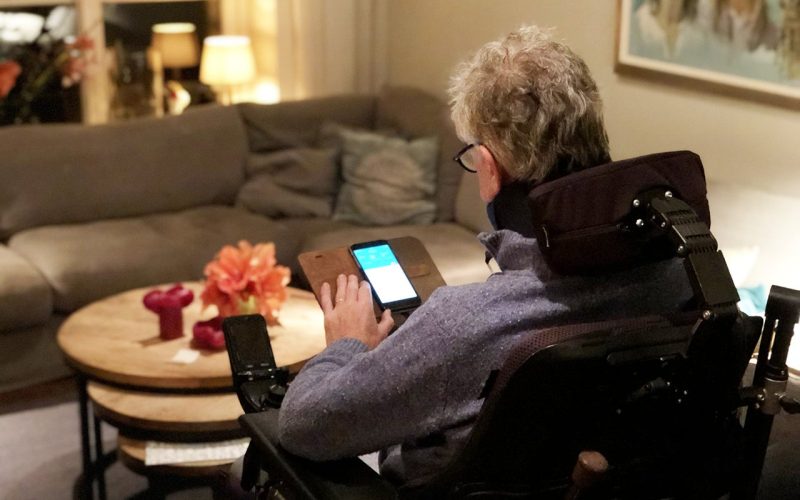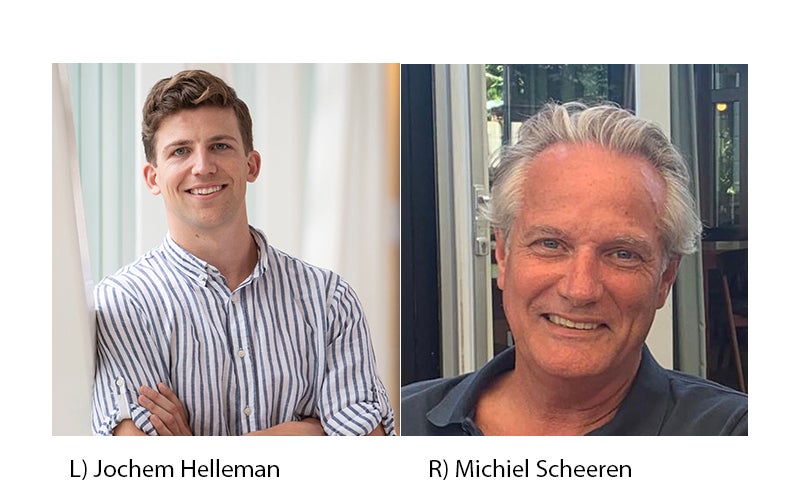For the past five years, rehabilitation care providers have used an online care platform to monitor the disease progression of a group of patients with a muscle disease such as ALS. PhD candidate Jochem Helleman of the UMC Utrecht Brain Center studied what patients think of this digital care. His conclusion: patients find remote care more pleasant than traditional care, with relatively many on-site appointments. They also feel safer, because they feel their treatment team is constantly keeping an eye on them. Helleman will receive her doctorate on this topic on Wednesday, Aug. 31.
Muscle diseases such as ALS have a huge impact on patients’ lives. These people’s muscles slowly fail, so they can do less and less independently, and need more and more help. Good care, provided by a specialized rehabilitation team, is then very important. “Unfortunately, many patients find traditional care quite intensive and burdensome, especially as the physical limitations become more severe,” says UMC Utrecht researcher Jochem Helleman. “People have to travel regularly to their hospital or treatment center, and then have multiple examinations and appointments there: for example, with a rehabilitation doctor, occupational therapist and physical therapist. Because the disease progresses very differently in some people than in others, these appointments are by no means always necessary.”
Several years ago, the ALS Center Netherlands developed the eHealth care platform “ALS Home Measurement & Coaching” together with patients and their loved ones. With ALS Thuismeten & Coachen, patients can share information about their disease with their caregivers via a (web) app. This keeps them informed of how the patient is doing, and enables them to provide tailored care. Over the past five years, a group of Dutch patients with ALS have been using Home Measurement & Coaching. This includes Michiel Scheeren, who was told in 2021 at the age of 62 that he has ALS. “I had an advertising agency, but took early retirement,” Scheeren says. “Now I’m on the board of the patient association and am committed to putting ALS on the map.”
Every four weeks, Scheeren fills out a questionnaire via the app about the progress of his disease. He also reports his weight weekly, and can let the app know how he is feeling on a daily basis. If he feels the need, he can use the platform to chat with a nurse. The data that patients share in this way gives the treatment team a detailed picture of how the disease is progressing for each patient. Patients themselves can also see exactly that in the app. “Of course, it is sometimes confronting to find that you are deteriorating. But it is part of the disease, and beating around the bush makes no sense,” says Scheeren.
Healthcare providers use the data that patients share via the app to make their treatment more personal. In doing so, patients no longer have to visit the hospital or treatment center at set times, but only when necessary. According to the patient himself, or according to the treatment team. “I really like being in control of my own treatment,” Scheeren said. “The moment I need it, I can schedule an appointment focused on the problem I have at that moment. I also notice that within the patient association everyone is full of praise for the app.”
Scheeren’s experiences match what comes out of Jochem Helleman’s doctoral research. As many as 82 percent of people say they find care with eHealth more pleasant than care without eHealth. An even larger group, 96 percent, would recommend this form of care to other patients. 95 percent of people like the personalized feedback they receive through the app, and 87 percent feel they have more control over their care. People also use the care platform faithfully, up to an average of 19 days before death. A total of 50 patients with ALS, PSMA or PLS participated in Helleman’s study. Literature reviews Helleman conducted also found that patients who use eHealth experience a greater sense of security.
In the Netherlands, ten ALS treatment teams in eight rehabilitation institutions currently offer ALS Home Measurement & Coaching. By providing proper training, the ALS Center wants to ensure that the use of eHealth in the treatment of muscular diseases becomes the standard. Experts at UMC Utrecht are also continuously working on extensions for the app. For example, during his doctoral studies, Helleman researched ways for patients to measure their lung function at home.
This is what patients think of the ALS Home Measurement & Coaching digital care platform:

